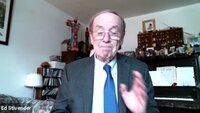| Title |
Stivender, Ed OH26_002 |
| Creator |
Weber State University, Stewart Library: Oral History Program |
| Contributors |
Stivender, Ed, Interviewee; Harris, Kandice, Interviewer and Video Technician |
| Collection Name |
Storytelling Festival Oral Histories |
| Description |
The WSU Storytelling Festival was implemented by the Friends of the Stewart Library in 1992. The library sponsored and managed the annual festival until 1998, when the festival was moved to the Department of Teacher Education, with the Library continuing as a sponsor. The three-day festival entails storytellers from all over the nation, including youth storytellers. The events are made up of workshops and presentations, a fund-raising banquet, and a wrap-up of wonderful stories from gifted performers. |
| Abstract |
The following is an oral history interview with Ed Stivender conducted on March 18, 2021, via Zoom, by Kandice Harris. Ed discusses his life, his experiences during his storytelling career, and his memories of the Weber State University Storytelling Festival.; The following is a video clip of an oral history interview with Ed Stivender, conducted on March 18, 2021, via Zoom Communications Platform, by Kandice Harris. In this video clip, Ed describes the qualities of a strong storyteller. |
| Image Captions |
Ed Stivender Circa 2015; Ed Stivender speaking about the qualities of a strong storyteller |
| Subject |
Ogden (Utah)--Maps; Storytelling; Storytelling festivals; Digital Storytelling; Storytelling--United States; COVID-19 Pandemic, 2020- |
| Keywords |
Virtual storytelling festivals; Weber State University; Professional storytellers |
| Digital Publisher |
Stewart Library, Weber State University, Ogden, Utah, USA |
| Date |
2021 |
| Temporal Coverage |
1977; 1978; 1979; 1980; 1981; 1982; 1983; 1984; 1985; 1986; 1987; 1988; 1989; 1990; 1991; 1992; 1993; 1994; 1995; 1996; 1997; 1998; 1999; 2000; 2001; 2002; 2003; 2004; 2005; 2006; 2007; 2008; 2009; 2010; 2011; 2012; 2013; 2014; 2015; 2016; 2017; 2018; 2019; 2020; 2021 |
| Medium |
oral histories (literary genre) |
| Spatial Coverage |
Hartford, United States, Connecticut, hartford, Town of Hartford, https://www.sws.geonames.org/4835797, 41.76371, -72.68509; Jonesborough, United States, Tennessee, Washington, https://sws.geonames.org/4633848, 36.29427, -82.47348; Ogden, United States, Utah, Weber, https://sws.geonames.org/5779206, 41.223, -111.97383; Orem, United States, Utah, Utah, https://sws.geonames.org/5779334, 40.2969, -111.69465; Republic of indonesia, Indonesia, https://sws.geonames.org/1643084, -5, 120; Republic of Austria, Austria, https//sws.geonames.org/2782113, 47.33333, 13.33333; New Zealand, New Zealand, https://sws.geonames.org/2186224, -42, 174 |
| Type |
Text; Image/StillImage; Image/MovingImage |
| Access Extent |
22 page PDF; Video clip is an mp4 file, 204 MB |
| Conversion Specifications |
Filmed and recorded using Zoom Communications platform. Transcribed using otranscribe.com. |
| Language |
eng |
| Rights |
Materials may be used for non-profit and educational purposes, please credit University Archives; Weber State University; Background music for the opening of the video clip was downloaded from https://uppbeat.io/t/sky-toes/the-long-ride-home; License Code SHMYB9XWFGM8KLVU; Background music for the closing of the video clip was downloaded from https://uppbeat.io/t/yeti-music/gentle-breeze; License Code IWGKRYG7XHQOMZY0 |
| Source |
Stivender, Ed OH26_002 Weber State University Archives |
| Format |
application/pdf; video/mp4 |
| ARK |
ark:/87278/s6azyakd |
| Setname |
wsu_sf |
| ID |
111921 |
| Reference URL |
https://digital.weber.edu/ark:/87278/s6azyakd |
| Title |
Stivender, Ed OH26_002 |
| Creator |
Weber State University, Stewart Library: Oral History Program |
| Contributors |
Stivender, Ed, Interviewee; Harris, Kandice, Interviewer and Video Technician |
| Description |
The WSU Storytelling Festival was implemented by the Friends of the Stewart Library in 1992. The library sponsored and managed the annual festival until 1998, when the festival was moved to the Department of Teacher Education, with the Library continuing as a sponsor. The three-day festival entails storytellers from all over the nation, including youth storytellers. The events are made up of workshops and presentations, a fund-raising banquet, and a wrap-up of wonderful stories from gifted performers. |
| Abstract |
The following is an oral history interview with Ed Stivender conducted on March 18, 2021, via Zoom, by Kandice Harris. Ed discusses his life, his experinces during his storytelling career, and his memories of the Weber State University Storytelling Festival. |
| Image Captions |
Ed Stivender Circa 2015 |
| Subject |
Ogden (Utah)--Maps; Storytelling; Storytelling festivals; Digital Storytelling; Storytelling--United States; COVID-19 Pandemic, 2020- |
| Keywords |
Virtual storytelling festivals; Weber State University; Professional storytellers |
| Digital Publisher |
Stewart Library, Weber State University, Ogden, Utah, USA |
| Temporal Coverage |
1977; 1978; 1979; 1980; 1981; 1982; 1983; 1984; 1985; 1986; 1987; 1988; 1989; 1990; 1991; 1992; 1993; 1994; 1995; 1996; 1997; 1998; 1999; 2000; 2001; 2002; 2003; 2004; 2005; 2006; 2007; 2008; 2009; 2010; 2011; 2012; 2013; 2014; 2015; 2016; 2017; 2018; 2019; 2020; 2021 |
| Medium |
oral histories (literary genre) |
| Spatial Coverage |
Hartford, United States, Connecticut, hartford, Town of Hartford, https://www.sws.geonames.org/4835797, 41.76371, -72.68509; Jonesborough, United States, Tennessee, Washington, https://sws.geonames.org/4633848, 36.29427, -82.47348; Ogden, United States, Utah, Weber, https://sws.geonames.org/5779206, 41.223, -111.97383; Orem, United States, Utah, Utah, https://sws.geonames.org/5779334, 40.2969, -111.69465; Republic of indonesia, Indonesia, https://sws.geonames.org/1643084, -5, 120; Republic of Austria, Austria, https//sws.geonames.org/2782113, 47.33333, 13.33333; New Zealand, New Zealand, https://sws.geonames.org/2186224, -42, 174 |
| Type |
Text; Image/StillImage |
| Access Extent |
22 page PDF |
| Language |
eng |
| Rights |
Materials may be used for non-profit and educational purposes, please credit University Archives; Weber State University |
| Source |
Stivender, Ed OH26_002 Weber State University Archives |
| Format |
application/pdf |
| Setname |
wsu_sf |
| ID |
111964 |
| Reference URL |
https://digital.weber.edu/ark:/87278/s6azyakd/111964 |





